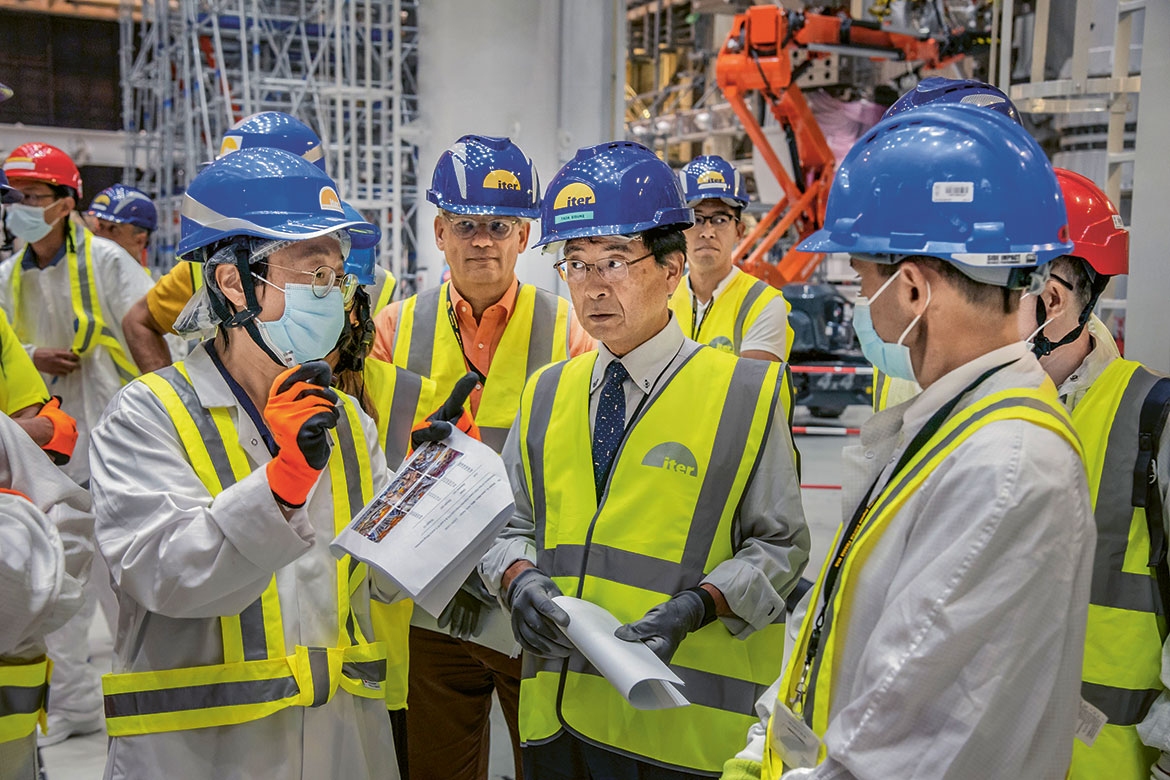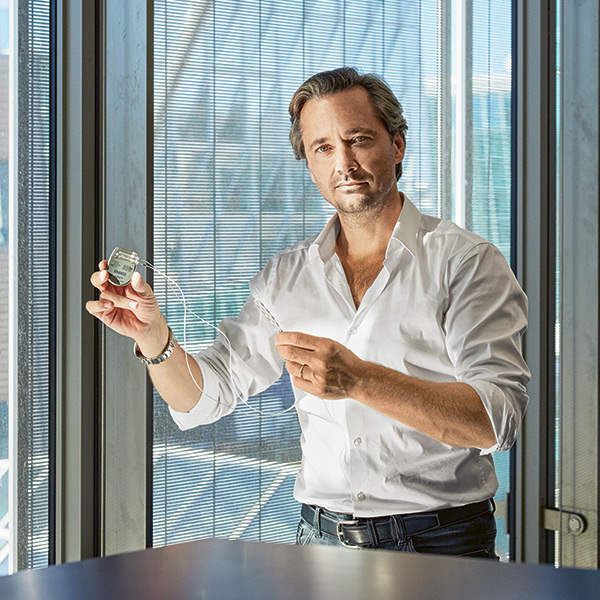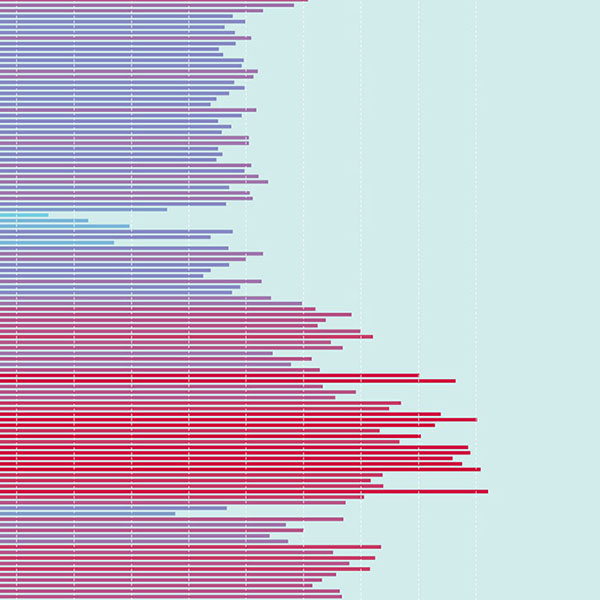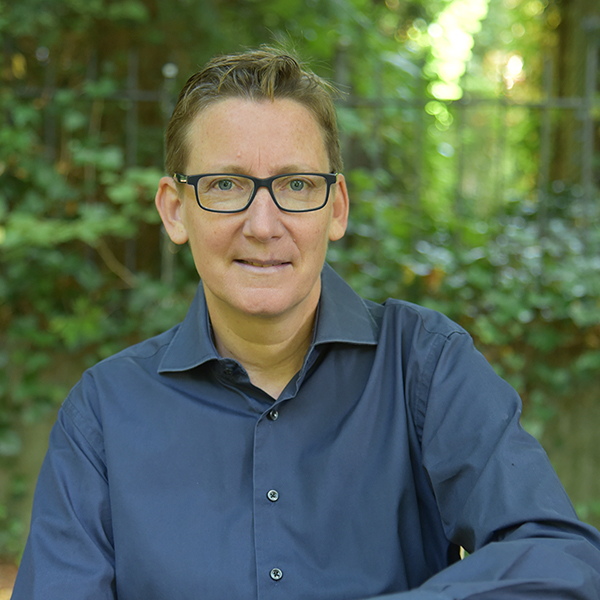INTERNATIONAL COOPERATION
New hurdles to cross-border research
China’s aggressive approach and the Russian invasion of Ukraine are both posing new problems for research collaboration. The world of science is urgently looking for ways to regulate future research collaboration with non-democratic countries.

International collaboration par excellence: magnetic expert Min Liao (left) and the head of engineering Xavier Bravo (right) in discussion with the director-general of ITER, Eisuke Tada (centre). | Image: ITER
“We want to unite people from all over the world to push the frontiers of science and technology, for the benefit of all”. These uplifting sentiments are from the mission statement of CERN in Geneva, founded in 1954 under the patronage of UNESCO. On its website, CERN goes on to explain how science can offer us a common language and enable personal contacts beyond the confines of international politics. In 1955, for example, a delegation of researchers from the Soviet Union even came to visit. Most people today also believe that global problems such as climate change and pandemics are in obvious need of global cooperation.
The foundations of international collaboration have been severely shaken by Russia’s invasion of Ukraine, however. CERN has suspended Russia’s observer status, banned its own researchers from working with Russian institutions, and announced that it will not renew its present cooperation agreement with Russia when it expires in 2024.
Individual researchers are also adopting a similarly tough approach – e.g., the editor-in-chief of a scientific journal, who is willing to speak out on condition of anonymity: “Scientists from all around the world shall collaborate, but collaboration with states that are not legitimate is not a good idea”. To him, that ‘legitimacy’ is absent in all non-democratic states because by definition they cannot claim to represent the culture of their own population.
No civil society in China
There is a relatively clear desire to boycott Russia at present. But the question of how to cooperate with China is a much more complex matter. It is adopting an increasingly aggressive stance on the world stage, and human rights there are deteriorating. China’s new data-protection law is making it particularly difficult for foreigners to enter into collaborations with Chinese researchers. The law came into force in November 2021, and while it protects the users of digital services from the provider companies, it also guarantees the Chinese state unrestricted access to their information.
Then there is China’s new National Intelligence Law of 2017, which requires all citizens of the country to cooperate with the authorities if required to do so. This means that potentially every Chinese man and woman can be compelled to work with the regime.
The attitude of the Chinese government stands in contradiction to the values of science itself: “Almost every principle of integrity is being disregarded”, says Ralph Weber, a professor of political science at the University of Basel. He is researching into Sino-European science policy, and paid extended research visits to universities in Beijing in both 2003 and 2010.
In Western democracies, he says, science enjoys a high degree of autonomy from politics. But in China, these systems are not separated. A few years ago, he says, things were perceived as being less problematic. “But since Xi Jinping assumed power, the country has been closing itself off in an increasingly authoritarian matter”.
At least until the recent war in Ukraine, says Weber, it was still possible to work together with regime opponents in countries such as Russia. But China has long lacked any kind of civil society that might act independently of the state. In a system that imposes itself in such an authoritarian manner, he says, trust in individuals is impossible: “As for me, I’ve ceased all contact with the people from China whom just a few years ago I would have regarded as my friends”. Weber’s advice today is simple: “Cooperation on selected issues is still possible, but not on the basis of interpersonal trust”.
Not everyone sees the situation as quite so bleak. Basile Zimmermann is a lecturer at the University of Geneva and the director of its Confucius Institute, and he believes that the West is overreacting to China. “There’s a very old, collective fear from the East – the Barbarian invasions. And the media are making use of these ancient enmities”. He prefers a pragmatic approach. Neither China nor Europe is going to change its system overnight, and while dealing with the differences between them is not easy, he insists that China does actually respect the rules of other countries.
But European research institutions are worried, and find themselves in a real predicament today. China’s sheer size as a scientific power makes cooperation necessary. But how can one party protect patient data, for example, if the other party has to make it available to the state? Lidia Borrell-Damián is the Secretary General of the umbrella organisation Science Europe, and in her opinion, “[t]he situation is currently very difficult, because researchers are unclear on what would happen with their data if they are shared with researchers in China”. Various negotiations are taking place with China about possible cooperation agreements, but for the moment, they are stuck.
Researchers left to their own devices
Both Science Europe and swissuniversities (the umbrella organisation of Swiss tertiary education institutions) are at present working within certain guidelines based on anonymised real-world instances. For example, in one case a research partner wanted to prevent the publication of a paper; in another, embassy staff suddenly appeared at an event about a politically sensitive topic and started taking photographs of the participants; and in yet another, a Chinese university broke off contact after the hometown of its German partner university honoured a human rights activist. But in all these cases, a pragmatic solution was able to be found.
A sense of unease remains. In August 2021, for example, the media took up the story of a Swiss doctoral student at the University of St. Gallen whose supervisor had allegedly dropped him after he wrote a tweet critical of China. The student claimed that his supervisor had reacted to pressure from China, although the university denied it. All the same, their relationship as supervisor/student had broken down. The student’s doctoral studies are still terminated, a bitter aftertaste remains, and self-censorship has now become a topic of debate.
“Guidelines are fine, but they’re not enough”, says Ralph Weber, who has been advising several universities on these issues. He believes that they are already very aware of the problem. But researchers in democratic countries have to be better informed about the current situation in authoritarian countries such as Russia, China or Iran, in order to be able to decide for themselves whether they want to cooperate. To this end, says Weber, Switzerland needs a dedicated, national competence centre. “Perhaps we will have to place greater restrictions on the autonomy of researchers who are researching in military-related fields”, he says, “just like we currently place limits on research into human embryos”.
The Swiss State Secretariat for Education, Research and Innovation (SERI) sees things differently, however. “The Swiss Confederation is an enabler for international cooperation in research and innovation; the universities and their researchers are autonomous”, says Martin Fischer, SERI’s Head of Communication.
So the authorities are passing the buck to the researchers, like Jean-Marc Rickli, the head of Global and Emerging Risks at the Geneva Centre for Security Policy. He’s happy to offer his opinion, and is one of the people who are most insistently critical about the risks of cooperating with China. He is convinced that science and scholarship are going to have to steel themselves for the future, and has concrete proposals about how we might proceed.
Be prepared
For one thing, Rickli believes that we are going to have to act in order to prevent our technology from being used against us. “We have to dispense with the absurd Silicon-Valley mantra ‘Move fast and break things’”, he says. Instead of spreading technology as fast as possible before it has properly matured, we should rather take to heart the motto ‘security by design’, and hamper any misuse of technology from the outset. If a technology could have a potentially catastrophic effect, then a means of shutting it down in an emergency ought to be integrated in it. It was the fortuitous existence of just such a ‘kill switch’ that saved the British healthcare system in 2017 when it was paralysed by the ransomware ‘Wannacry’.
Another of Rickli’s proposals is aimed at university administrators. He believes that they should consider in advance how they might maintain critical thinking and financial independence, even in the face of attempts to exert pressure from the outside. This could prevent reputational damage such as occurred in the above-mentioned case at the University of St. Gallen. However, one thing is clear to everyone: if we’re going to collaborate with authoritarian regimes, then we need more knowledge – whether it’s about our own security systems or about how authoritarian governments function. It doesn’t matter whether we do this through competence centres or through education in general. Zimmermann sums it up: “If we don’t understand each other, we’re going to be ill-equipped to react in times of crisis”.




